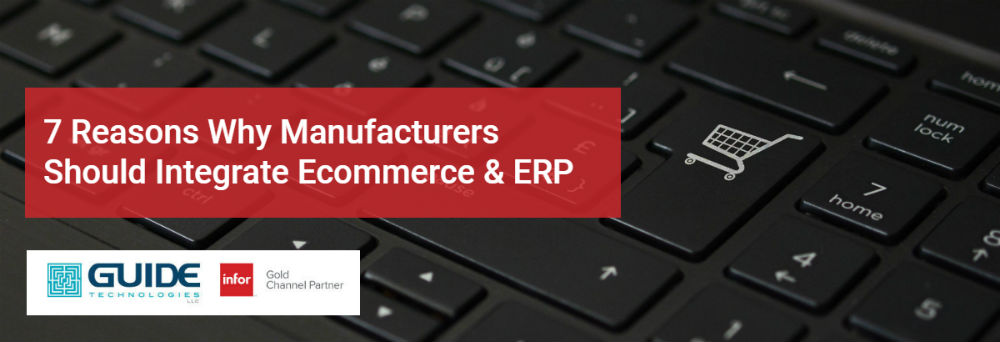October 30, 2018

Ecommerce & ERP: A Dynamic Duo
When most people think of enterprise resource planning (ERP), they think of internal, back-office functions like workflow, accounting, and business analysis. ERP is not just for internal processes, however. These powerful solutions can also make managing customer-facing processes like CRM, marketing, support, and ecommerce much easier, more efficient, and more profitable.
Ecommerce in particular stands a lot to gain from ERP integration. By integrating these systems, companies that manufacture goods and then sell them online on their own ecommerce platform, either directly to end-user customers or to retailers, VARs and distributors, can get crucial ecommerce data directly from the ERP system (and vice-versa). This brings a number of advantages and business benefits.
Here are seven big ways integrated ERP and ecommerce can work together to enhance your manufacturing business.
1. Increase self-service functionality. The ERP system is able to present real-time data on the store front, allowing customers to view available inventory and updated order status and to track shipments. By enabling customers to better serve themselves, companies can reduce the service burden of their sales, warehouses, and contact centers.
2. Reduce inventory cost by having updated sales information. Always-accurate, always-available is the key to effective inventory management. By integrating your ERP and ecommerce systems, all web sales information will instantly appear in your ERP system, and inventory will also be updated. Customers can immediately know if a product is in stock, preventing costly miscommunications, delivery delays, and customer service problems.
3. Generate financial reports in ERP based on web transactions. Ecommerce applications are usually able to generate reports on sales, but integration with ERP provides more. You can produce a balance sheet, profit/loss statement, trial balance, cash flow, and more, providing financial transparency throughout the organization.
4. Increase internal productivity. By streamlining multiple business processes, there is reduced human resource interaction. Web sales are integrated to the ERP system in real time, allowing for instant tracking and further processing. The result is a reduced, more efficient order fulfillment cycle.
5. Reduce human involvement, data redundancy, and error. Similar to internal productivity increases described above, integration also enables customer and order details to be shared between both systems, eliminating the need to re-enter data. This also reduces the possibility for human error.
6. Increase customer satisfaction. Make your customers happy by providing easy access to the most up-to-date product information, inventory, and order tracking by integrating an ERP solution. As an added benefit, it also reduces the business’s operational hassle.
7. Gain better control. Lastly, the integration of ecommerce and ERP solutions allows business leaders to achieve competitive advantage by having better control of their company and operations. Real-time data and predictive analytics enable faster decision making, and changes are executed smoothly and with less resistance through workflows and automation.
Ecommerce & Industrial Manufacturing
For a long time, ecommerce was seen as a primarily B2C, retail business channel. Having seen how ecommerce transformed retail, B2B companies have gotten in on the revolution as well. One area that has been somewhat slower to adopt ecommerce is manufacturing and supply, particularly industrial manufacturing. However, as ecommerce technology has advanced, B2B capabilities have improved, and buyer demographics have changed, these companies are now seeing the importance of including ecommerce in their pursuit of digital transformation. According to the B2BecNews 2018 E-Commerce and Manufacturing Survey, less than 50% of B2B companies have an ecommerce site today, but 70% of those without will have one within 2 years.
Implementing ERP & Ecommerce Integration
A successful ecommerce and ERP integration is not just about the exchange of data, but about the seamless flow of business processes. Streamlining makes life easier for both the company and its customers, but only when implemented properly. One of the biggest hurdles to get over is finding the right combination of ecommerce and ERP platforms that work well together and support the kind of close integration that is needed for success. Infor® provides a full suite of world-class business applications that are specialized by industry and built for the cloud to enable a global supply chain, networked analytics, and an artificial intelligence-led user experience. Infor’s solution for industrial manufacuturing, Infor CloudSuite Industrial, includes high value expansion opportunities through packaged integrations for many business areas, including ecommerce.
ERP & Ecommerce Integration Experts
Want to get started with Infor solutions? Need help integrating and implementing Infor ERP and ecommerce solutions? Contact Guide Technologies. We are an Infor Gold Channel Partner with over 20 years of experience helping manufacturers find, implement, and optimize software solutions to grow and improve their business.
